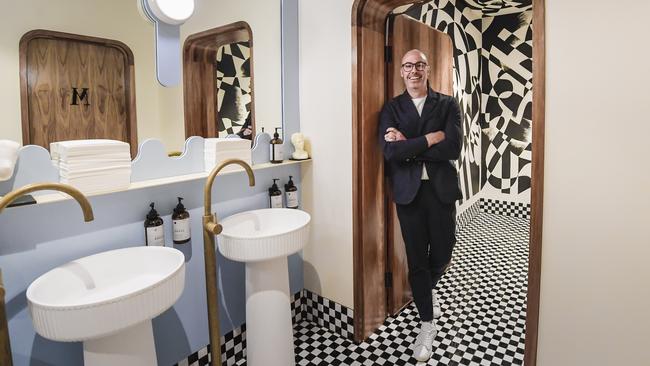City of Churches’ alter ego shines bright
Architect Dave Bickmore recalls a time when Adelaide suffered from an inferiority complex.

Architect Dave Bickmore recalls a time when Adelaide suffered from an inferiority complex.
“For so long, we compared ourselves to Melbourne or Sydney, but we’ve stopped doing that,” says Bickmore, the director of Studio-Gram, an in-demand design firm known for its memorable and multilayered restaurants on the east coast of Australia.
“We’ve realised that we have our own identity and are starting to celebrate that.”
When the studio launched in 2014, the majority of its projects were in NSW and Victoria. But the relaxation of South Australia’s licensing laws a few years back triggered a rebirth of the state’s hospitality scene.
Bickmore and his team have been busy during Covid designing fit-outs for Arkhe in Norwood, with chef Jake Kellie relocated from Singapore’s Michelin-starred Burnt Ends, and Fugazzi Bar & Dining Room on cobbled Leigh Street.
“Fugazzi is the 12th venue we’ve done for Simon Kardachi,” he says, adding that the avid restaurateur issued him a one-word brief: “Svelte.”
The ultra-polished diner, a blend of marble, drapery and rich textures, is a nostalgic nod to 1980s New York and movies like 2013’s The Wolf of Wall Street.
In contrast, Arkhe has an industrial palette – granite cobblestones, salvaged timbers and leather hides – befitting Kellie’s flame-kissed fare.
World-class eateries are one example of Adelaide’s fresh buzz. A cluster of fashionable hotels is reimagining the City of Churches as a style sanctuary. Among them is the new 251-room Sofitel Adelaide in the CBD. From the marble-clad lobby to the leather padded lifts to the triangular bathtubs, every detail of this $150m hotel is bespoke.
Nearby, on Light Square, philanthropists Sophie and Nick Dunstone are blazing trails. Earlier this year, the couple unveiled Light, a not-for-profit social enterprise that brings together the performing arts, path-breaking technology and exceptional food.
The Dunstones are Covid refugees, returning to Adelaide from Hong Kong after 20 years living abroad to discover a city greatly changed. “There’s a palpable undercurrent of social dynamism, driven by the city’s young and only accentuated during Covid,” said Nick Dunstone in an interview for Travel + Luxury magazine, which is published on Friday in The Australian.
While there have been about 40 Covid cases in SA since its borders reopened on November 23, and interstate arrivals will require a negative test 72 hours before entering the state, that’s hardly enough to darken Adelaide’s lustre. The state capital was ranked the world’s third most liveable city by The Economist’s Global Liveability Index 2021, behind Auckland and Osaka, in a survey that assesses criteria including culture, environment and infrastructure. The city was also recognised by National Geographic as a desirable destination owing to its ever-expanding green spaces.
Cultural and civic attractions are booming too. At Lot Fourteen, the future industries precinct on North Terrace, historic buildings have been retrofitted to house the Australian Space Agency. The cornerstone of the project is the national Aboriginal Art and Cultures Centre opening in 2025, honouring more than 60,000 years of First Nations culture.
In Adelaide, the blend of the extremely old and the gleamingly new is like nowhere else.



To join the conversation, please log in. Don't have an account? Register
Join the conversation, you are commenting as Logout